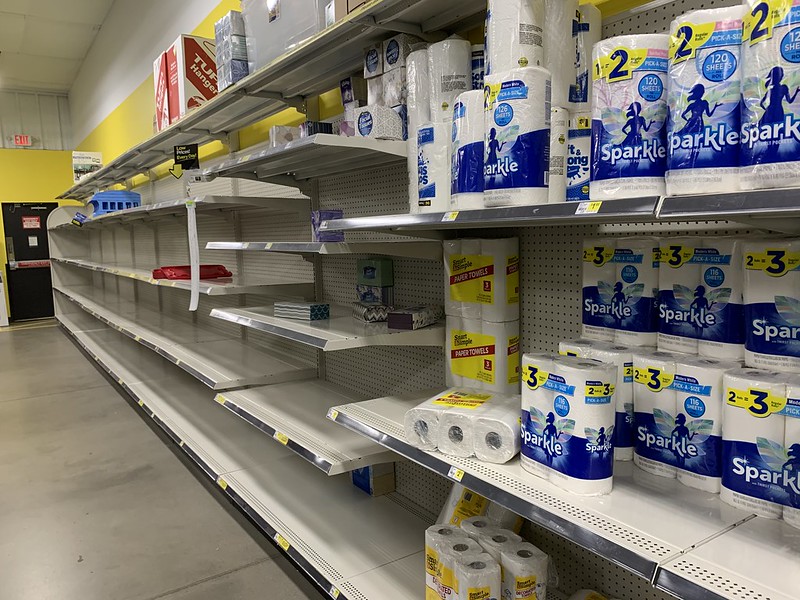Lack Of Slack, Redux

Photo Credit: Bartleby || Remember the 2020 toilet paper, paper towel, and cleaning supplies shortage. That got worked out after a reasonable period. Now if we could only find corrugated cardboard.
After I wrote last night’s piece, I thought of another area that is investable. It is unfashionable today to be vertically integrated. There’s a good reason for that. When you are vertically integrated your immune from the pricing signals between divisions that could instruct you to do things differently. (i.e., sell your intermediate goods to other companies, or buy intermediate goods from other companies. Low price wins.) As such, because of activist investors, companies have been broken up into simpler component units because management teams are sharper when they are managing just one thing.
But the benefits of vertical integration mean that when there is a supply crisis, they can keep running their business on affected. I’ll give you an example: a favorite company of mine called Industrias Bachoco [IBA]. They’re one of the biggest meat producers in North America; mostly they grow chickens, and they produce most of the feed that they use. Did you know that there is a feed shortage? I don’t think it’s affecting Industrias Bachoco. Anyway, it has cheap valuation, no debt, and in this case, an advantage from being vertically integrated.
I want to talk about another aspect of what I discussed last night. I read an article today which said that the most scarce resource in the United States for building homes is not lumber, but land that is already approved to be built on. Zoning is perhaps well-meaning, but that doesn’t help younger people who are looking to buy homes.
So this is in this environment there are bidding wars, and 20% of the buyer base is investors looking to buy at least the house out. In the old days, and this may not be true anymore, but I doubt it, we used to say a market was overheating when it had more than 10% investors.
And this article indicates that housing prices in the United States are as high as they were at the peak of the housing bubble back in 2007-2008. Does that mean we’re in a bubble now?
Well, we might be in a bubble for stocks. You can only be in the 99th percentile of valuations for a couple of years at most. But housing is different in this environment because the terms of the loans being done are better than back during the bubble. However, bit by bit we are seeing leverage rise on home purchases. A bubble might be forming, but we’re not there yet. (Hey, thanks Fed. You never admit to being wrong.)
And Now for Something Marginally Related Completely Different
Before I close this evening, I want to talk about a somewhat different topic. I think one of the weaknesses of academic economics, and those who use it within the government and the central bank, is that they think that they can eliminate the boom-bust cycle. When I read about the startup, shutdown, and switching costs that many capital-intensive industries have to go through in order to increase or decrease capacity, or change capacity to a different form, I think economists don’t realize that it is impossible to eliminate the boom-bust cycle.
It takes a long time and a big opportunity to make capital-intensive firms expand capacity. It takes a long time and a dearth of opportunities to make a capital-intensive firm go through shutdown of some capacity. And getting them to shift from one type of production to another takes a long time. They must be convinced that the shift will be profitable for many years.
Economics is a lot more complex than it seems for academics sitting in their chairs with their toy models. It would be far better to get some of them out working in some industrial, financial, and utility firms so that they can understand how difficult it is to work amid volatility.
And as I said, not quite in the same way last night, the virtue of capitalism is that it can deal with volatility more effectively than any other economic system. Supply and demand imbalances will get addressed, and the price mechanism will be the incentive to do so.
The supply imbalances will end, likely in the next two years. It will be replaced by other imbalances. That’s normal. We need to stop treating every problem as a crisis. We especially need to stop asking the government to intervene. In most cases, they will do more harm than good, and sometimes they will even prolong the crisis.
And if I didn’t say it last night, be sure to own companies that have strong balance sheets. You want them to be able to survive times of imbalance. As we have seen over the last 15 months, there are often unexpected troubles in an interconnected world.
Disclosure: Long IBA for clients and me
Disclaimer: David Merkel is an investment professional, and like every investment professional, he makes mistakes. David encourages you to do your ...
more


